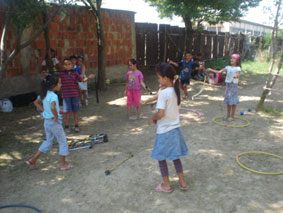


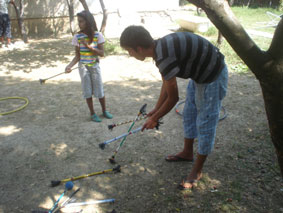
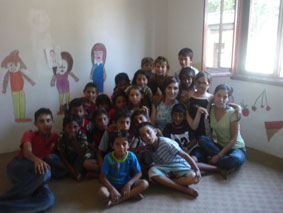
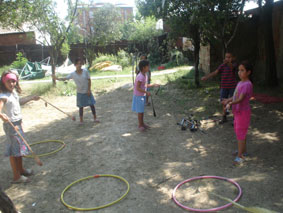
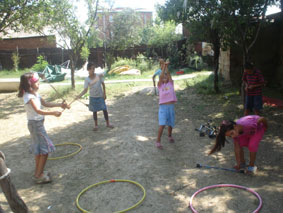
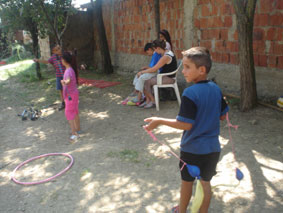


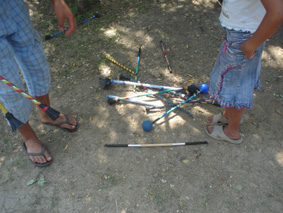
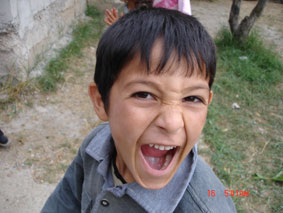
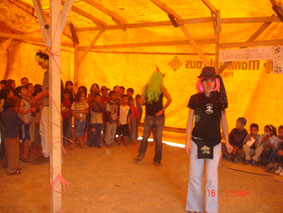
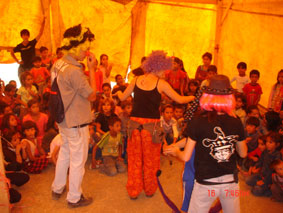
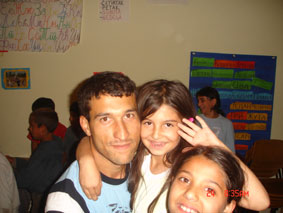
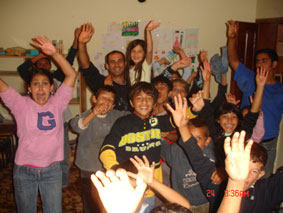
Sommercamp 2008
Playground Aktionistinnen bei Arbeit und Spiel...!
 |
 |
|---|---|
 |
 |
 |
 |
 |
 |
 |
 |
 |
 |
 |
 |
 |
 |
Filme:
Workshop:
http://www.youtube.com/watch? v=_m9P0o8FavU
Aufführung:
http://www.youtube.com/watch?v=HnZ51VREHuc&feature=related
Special thanks to Besiana Kastrati und Balkan Sunflowers!
Projektbericht von Balkan Sunflowers
Report by Balkan Sunflowers
Overview
BSF celebrated its 9 th anniversary on July 18th with a staff get together from all three centers. The celebration took place in Fushe Kosova where staff were split into mixed groups to solve riddles, play charades and other activities. Everybody shared a meal and cake afterwards, singing ?Happy Birthday? in the different languages. The event brought everyone together and the cooperation between staff from the different centers was excellent.
Two Coordinator meetings have taken place in July. One in Battlava, and one in Prishtina. These meetings gave the three Center Coordinators a chance to meet and discuss shared (and different) challenges and successes, get updated about developments in the different centers, and become informed of future developments. Among other things, Coordinators discussed among themselves ways to maintain high motivation levels among tutors, visions of the Learning Centers Network, transition from the Summer Program to the Autumn, increased communication and cooperation between centers, assessments, materials and outreach strategies. Coordinator meetings will be held bi-weekly from now on. The venue for meetings will rotate between centers, giving Coordinators increased opportunity to visit the other centers in the network and understand how they function.
There has been quite some effort put into research and meetings in new communities to establish the location for the fourth center. Original options for the location of the fourth center were Peja, Lipjan, Shtime or Podujevo. Staff interviews will take place at the beginning of August.
The Summer Program has been going strong during July. There have been some general issues common to the three centers, as well as the particular issues specific to each individual center. The program will continue for the first week of August and then there will be a two week holiday followed by a week-long Step-by-step training in which staff from all three centers will participate. This will give them a more comprehensive training and enable them to more effectively run the preschool and homework help programs in a very child-centered format. They will then welcome returning pupils and a new group of 5-6 year olds who will have an entire year to prepare for the first grade. ?
Six thousand Euros was donated by KFOS towards the Summer Program. Much of this grant will be used to acquire learning materials for the three centers. A trip to Skopje was made in order to research materials available there, and it was decided that instead of buying some items, when possible they will be made, mostly out of wood. This will be less expensive,and will better suit the needs of the centers.
Planning has begun for a September Learning Centers Network public event. Potential and past donors, Ministry of Education officers, and civil society working in education and with minorities will be invited to attend. Learning Center staff and children will welcome guests and present themselves and the project. The evening will be a mixture of both informational and entertaining presentations.
Preparations have been made for a meeting with the UK branch of Samsung in London. Balkan Sunflowers has subscribed to "Welcome Europe", and now has access to a database of information about European Funding programs. Several emails have been sent to the UK based foundations which were researched during the month of June. Proposals have been submitted to the Royal Dutch Embassy (under the MATRA/KAP program) the Council of Europe, and the Allan and Nesta Ferguson Foundation. The period from September through to December will be a busy one, with many calls for proposals and deadlines for grants from different foundations.
There has been more research into online donation systems. These various systems will be put in place only once some decisions have been taken regarding a revamp of the website, which is quite outdated at present.
3. Summer Program
After getting the donated tents and tarpaulins in place, and figuring out solutions to the summer water shortages in Kosovo, we were able to get full swing into the program and begin to prepare all the children for classes.
As the summer program is different from the regular program, it took a bit of time for both staff and children to get accustomed to the idea of mini-centers: children rotating in groups among different activity areas. The attendance levels for the first week served as a gage according to which the rest of the summer program was planned. The second week of summer was noticeably calmer, with everybody feeling more confident in knowing exactly what they were doing. Our hopes for the staff to feel comfortable facilitating learning in a new summer setting were achieved with staff effectively continuing their support to the children through the changing program.
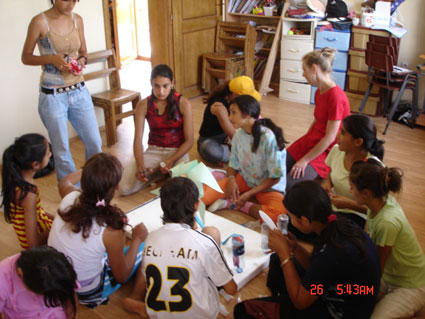
Although the number of children attending the summer program generally increased throughout July, it did not increase in such a drastic way as to become overwhelming to staff. Contrarily, it served to further encourage and motivate all staff, and bring new energy into the daily activities.
An experienced Dutch art teacher (Fri, in red in the photo) joined the program as a volunteer. Although she was primarily based in Fushe Kosova, she also led workshops in the other communities, using innovative techniques to inspire the children. The children enjoyed Fri?s especially those workshops using everyday recycled materials
We have over 50 staff and volunteers guiding children in different subjects, including the main school subjects such as math and language, so that they are academically and socially ready to face the challenges of their new school year in the next grade. Subjects being covered are: Math, Language-Serbian/Albanian, Nature and Environment, Arts, Theatre, The World around Us, English, Computers, Hygiene, Sports and Rules, and Civic Education, . All these subjects have been covered in fun and creative ways using different interactive activities and games.
The adjustments which ensued from setting up the mini-center system in the summer program has allowed staff and volunteers t become more confident in their abilities and develop new skills. Staff responsible for individual mini-centers or subjects have become more independent and comfortable supporting children in certain subjects. During the regular program ? the homework help program for instance - tutors work with children on a one-on-one basis, or with groups of two or three children. In this setting, and because of the smaller focus of the work, it is relatively easy to hold the attention of the children. 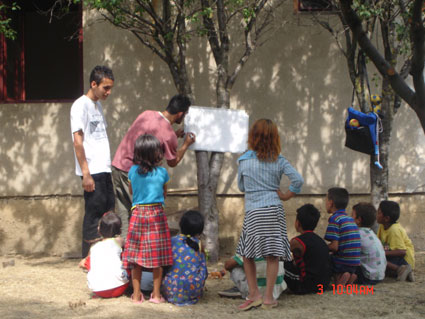
With the summer program, each tutor is working with bigger groups of children, and with more varied environments. We feared that these young tutors would not be as able to fully keep the children?s attention for the duration of the sessions. To counter this change in education style, it was very important to convey to tutors the importance of lesson planning and preparation. Learning Facilitators have been helping tutors a lot with planning, reporting and demonstrating examples of teaching tricks and techniques. This has worked extremely well, with tutors taking their new responsibilities on in a very conscientious way, not only helping their group, but the overall functionality of the whole center.
This development of skills and confidence was particularly visible in Gracanica one day:
Facilitators and Coordinators have come to trust the ability and competence of their Tutors, and have responded by giving them increased responsibilities. This in turn makes Tutors feel valued, which they most definitely are.
During the month of July, LCN Coordinators worked with each center in a weekly two hour planning session. During these two hours, goals were set for the week, activity plans were created and mini-training sessions took place. Staff discussed the coming week and set educational goals for the mini-centers. The staff were then put in pairs and planned daily lessons according to the weekly goals. These sessions will continue throughout the year. The level of involvement of LCN Coordinators will gradually decrease as staff become more competent and capable of planning the week independently.
Next steps:
In May,staff conducted baseline assessments of the children in Gracanica and Plemetina. The assessments consisted of narrative and graded assessments in five areas: social and emotional development, physical development, spoken language, mathematics and reading and writing. The Learning Facilitators used observation and various activities to assess the children in these five areas, working with small groups and keeping the atmosphere as relaxed as possible in order to effectively assess the children. In the last week of July the second round of assessments began for Gracanica and Plemetina and the baseline assessments began in Fushe Kosova.
Daily average attendance: 35 children in pre-primary, 50 children in homework help
Challenges and Next Steps:
Plemetina Learning Center (PLC)
Daily average attendance: 20 children in pre-primary, 40 in homework help
Staff at the Plemetina Learning Center have become more organised in their work and also among themselves. The regular staff members have accepted increased responsibilities, such as picking up children from their homes and escorting them back, preparing weekly plans and working more hours than during the regular program.
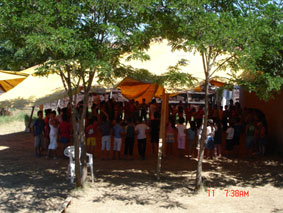
Challenges and Next Steps.
Fushe Kosova Learning Center (FKLC)
Daily average attendance: 133 children in pre-primary, 181 children in homework help
Fushe Kosova Pre-Primary Program:
After over a month of renovations on the house, the pre primary program in Fushe Kosovo opened its doors to 133 kids. The program currently has one learning facilitator and six tutors; one more facilitator will be hired to help with the overwhelming number of children and additional volunteers sought. The program has two shifts ? one in the morning and one in the afternoon. During the three hour shifts the tutors work with small groups of children with games, songs, art and other interactive activities, in order to prepare the children to enter the first grade in September. The children are learning how to read and write the alphabet and their names, how to count and classify and developing social and classroom skills needed to succeed in a regular school setting.
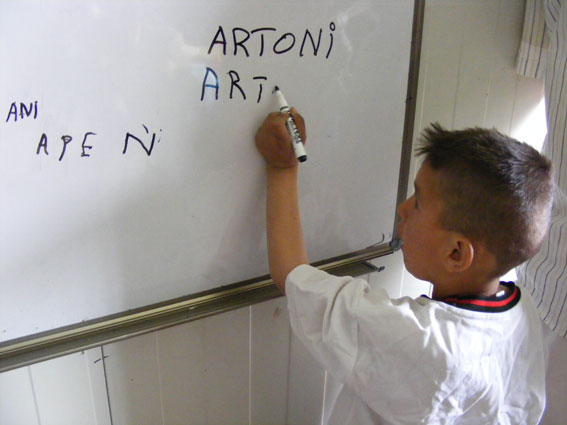
The six tutors were previously working with the older children in the homework assistance program and were selected because of the capabilities shown with the youngest group, but they are still inexperienced. To help the staff get the program off to a good start, three short trainings have been conducted on classroom management and positive discipline, interactive lesson planning and creating a child centered atmosphere. The staff was very active in these trainings and was able to directly apply what they learned into the program.
Challenges and Next Steps.